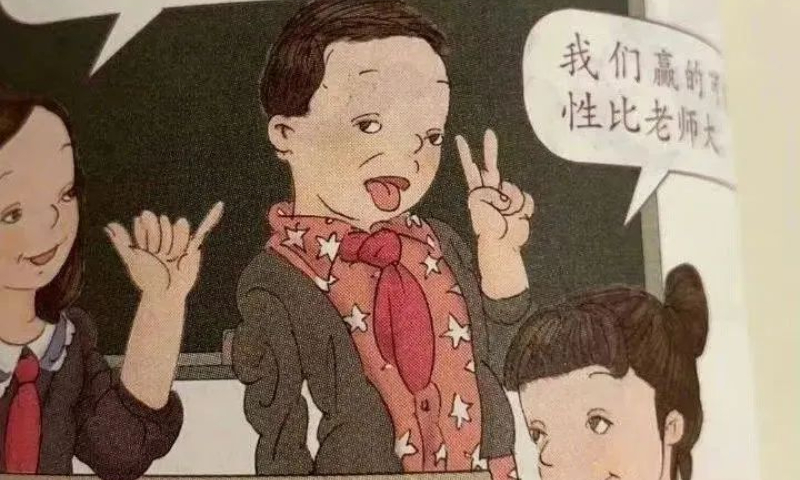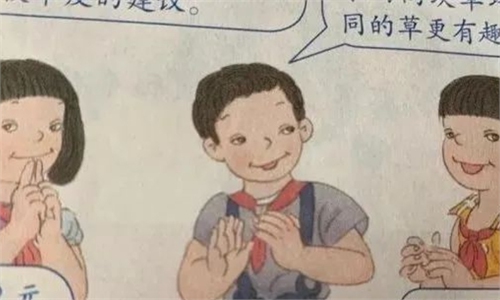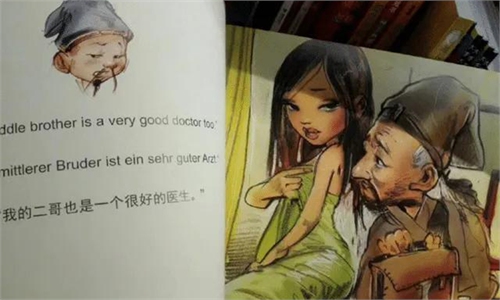
Screenshot of the controversial textbook Photo:Sina Weibo
It is not just a matter of aesthetics. A campaign spontaneously launched by Chinese netizens to expose more problematic teaching materials for minors, especially those that have been used in schools for more than a decade, has sounded an alarm on the country's ideological security, with many experts calling for high vigilance against problems in textbooks, which are viewed as a new battlefield for the West's cultural infiltration.
China's Ministry of Education announced on Monday night that it has established a special team to conduct a thorough probe into "toxic" textbooks for minors. The ministry vowed to hold those responsible for violations of discipline and regulations without leniency. The results of the investigation will be released to the public in a timely manner.
In the latest example, an exam reference book with a photo showing a Japanese soldier carrying an elderly Chinese lady on his back being depicted as Chinese model soldier Lei Feng has come under fire amid a nationwide outcry for thorough investigations of problematic books for children, following the state-owned education publisher's "ugly illustration" scandal.
Many netizens said that the problem in this book was more odious than the textbooks - published by the People's Education Press - which were criticized for being racist and pornographic, since the photo was staged by the Japanese army to downplay its atrocities committed in China during World War II.
Amid public outrage, the ministry has ordered a thorough inspection of elementary and middle school textbooks nationwide. However, this has failed to quell public sentiment, as the campaign reminded many of similar cases in Northwest China's Xinjiang Uygur Autonomous Region and China's Hong Kong Special Administrative Region (HKSAR) - where problematic textbooks that involve inciting subversion, separatism and distorting history poisoned students' minds and became a root cause of regional turbulence.
On Chinese social media platforms, a case again came under the spotlight in recent days that revealed school classrooms were a secret place where extremists looked to spread their dangerous ideologies in the early 2000s in Xinjiang.
Sattar Sawut, former deputy secretary of the education and work committee in Xinjiang, was sentenced to death with a two-year reprieve for using his power when he was the head of the Xinjiang Basic Education Curriculum Reform Group to spread his extremist ideologies via books to influence children.
Local authorities revealed that the separatist criminal group incorporated content involving ethnic separatism, violence, terrorism and religious extremism into minority-language textbooks, which were used for 13 years and caused grave consequences.
Similarly in the HKSAR, the city's education bureau has vowed to remove textbooks and reading materials from schools that involve inciting subversion, separatism and other illegal content forbidden by the new National Security Law, and it will regularly check if such books exist within campuses.
The move came after many textbooks previously used in Hong Kong schools were charged by parents and observers with "inciting hatred toward the Chinese mainland" and even encouraging students to participate in anti-government protests.
"The textbooks exposed in recent netizens' campaigns are horrifying. Lessons from the Hong Kong and Xinjiang regions sounded an alarm to us that problematic textbooks are not a matter of aesthetics, but a threat to the country's ideological security and the future of the nation," Qin An, director of the Internet Policy and Law Research Center under the Law School in Tianjin University, told the Global Times on Monday.
Illustrations in many textbooks have obvious Westernized elements that vilify the Chinese. They are a clear sign of ideological struggle, Qin said, warning relevant departments to be alert to the possible interference of hostile forces outside China that aimed to poison the aesthetics and thinking of the next generations of Chinese people.
Some observers noted that textbooks represent a new battlefield for cultural infiltration, and any problems in the education field should be watched with high vigilance, citing the dissolution of the Warsaw Pact and the collapse of the Soviet Union, which many scholars attributed to the continued infiltration of the message of "democracy" in the West.
But some experts believed that it is too early to draw a conclusion as the facts are not clear, and they warned against attempts to strike down the whole textbook industry by taking advantage of the "ugly textbooks" scandal.
The scandal showed that insufficient attention had been paid to the textbooks, which violated the bottom lines of ethical values. "We should keep alert to shoddy and problematic textbooks but avoid drawing conclusions so fast, or even taking such cases as a color revolution launched by overseas anti-China forces," Zhang Yiwu, a professor of Chinese literature at Peking University, told the Global Times.
Mainstream Chinese society is confident in the country's current political system, development path and model. People have a strong sense of national identity and will not easily compromise with Western ideological rhetoric, Zhang said, noting that "we should have faith that the West has no chance of brainwashing the Chinese people and pursuing peaceful evolution in the country."



